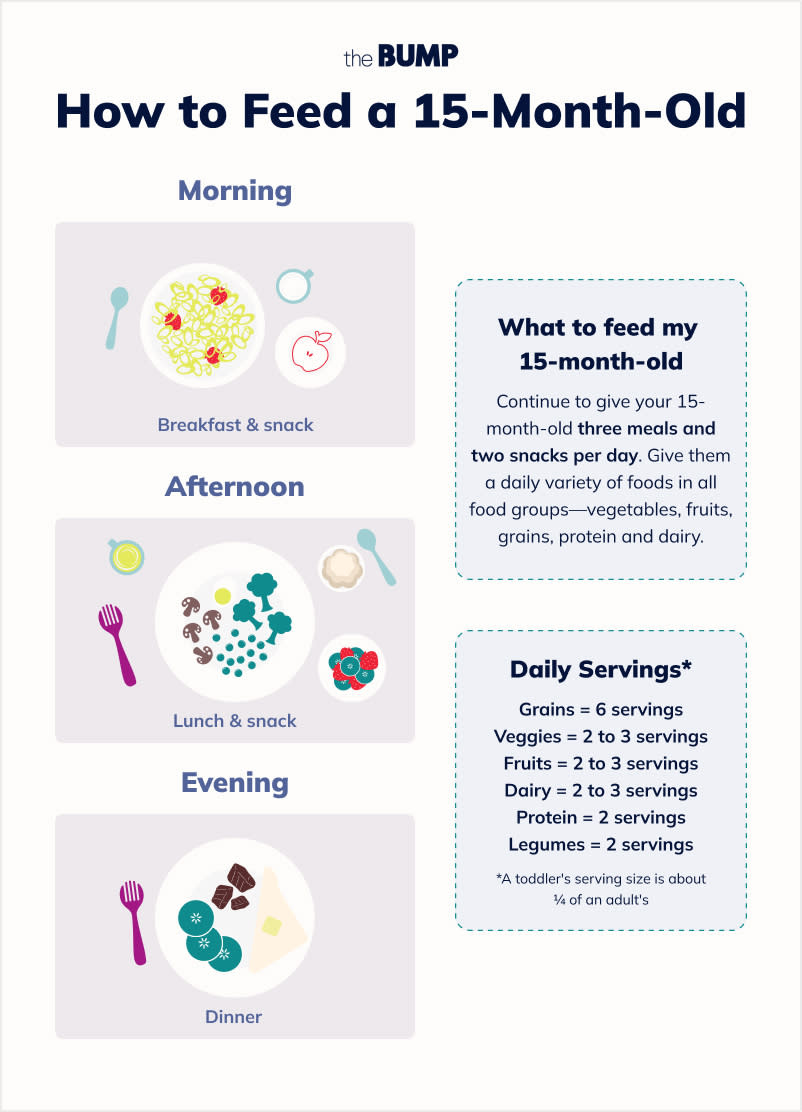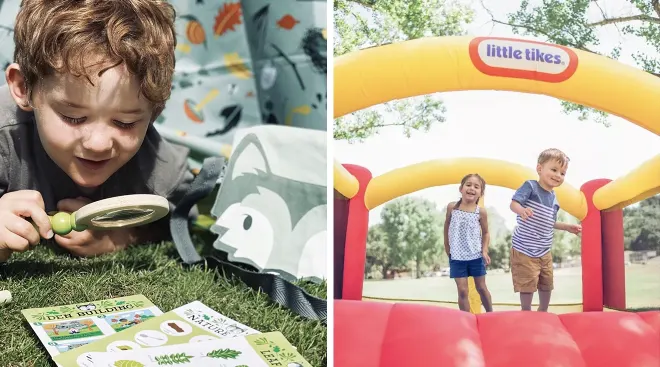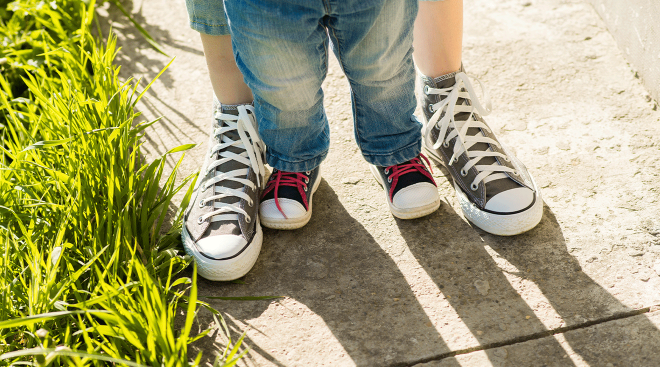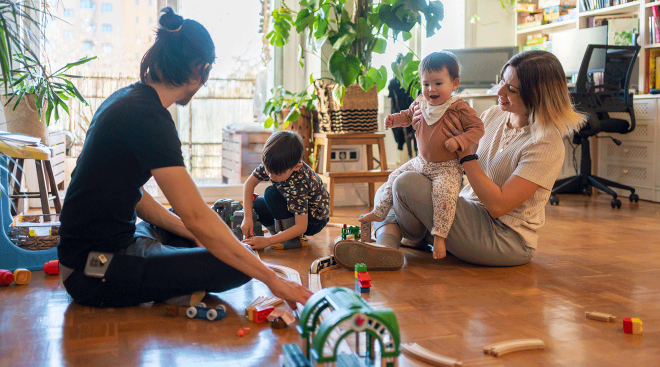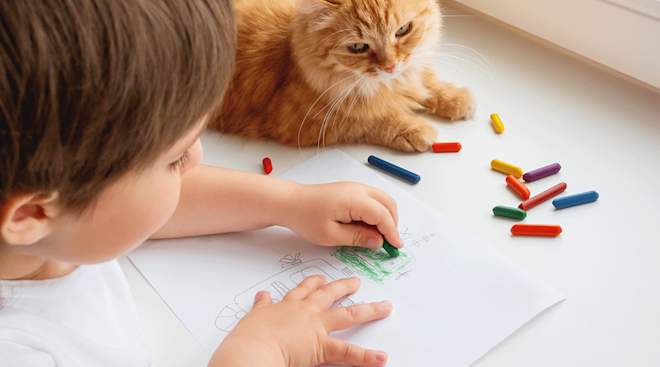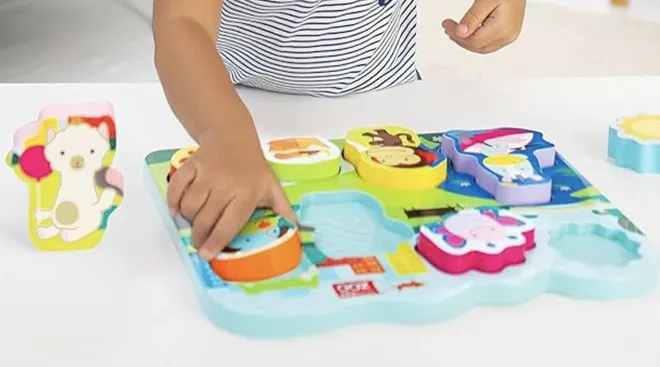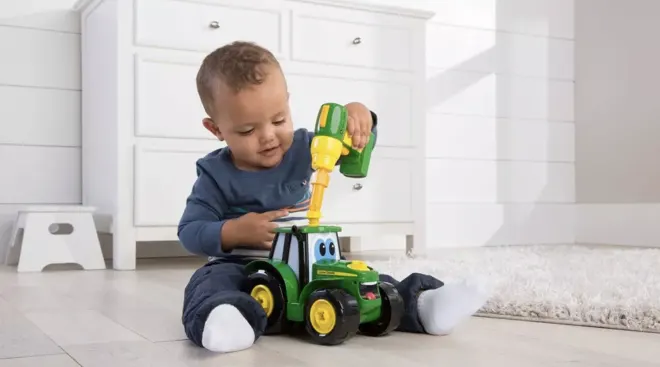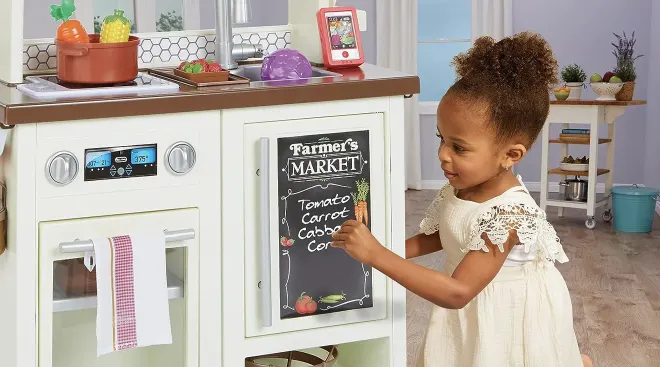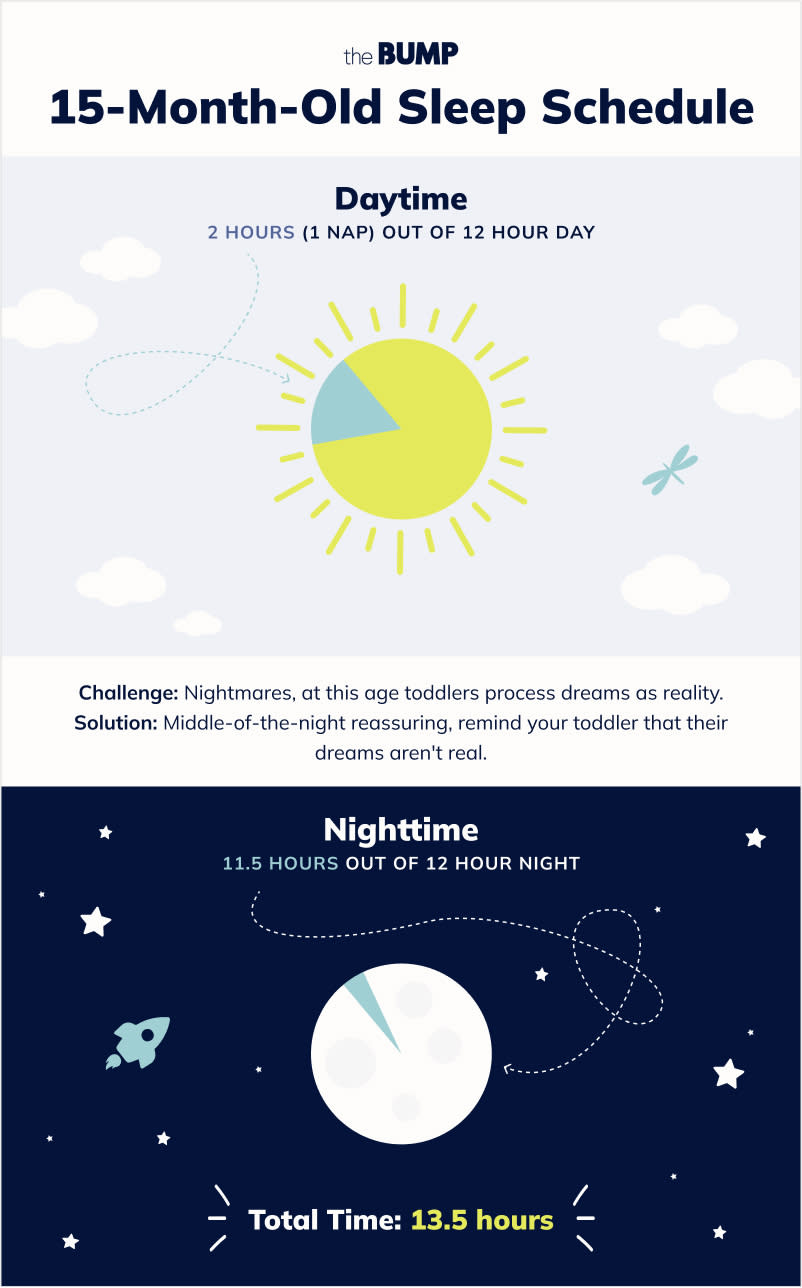Your 15-month-old is now a fabulous sidekick. You can start to ask for your 15-month-old's help carrying (small) things, throwing away trash and picking out books. This is great for a toddler's self-esteem and teaches them to pitch in around the house.
Your 15-month-old continues to grow and develop in a variety of ways, and you'll see the doctor this month to give an update on their progress.
15-month-old weight and height
How much should a 15-month-old weigh and measure? According to the World Health Organization, the median weight for a 15-month-old is 21.2 pounds for girls and 22.7 pounds for boys; median height is 30.5 inches for girls and 31.2 inches for boys.
Your child's weight, height and head circumference will be measured at their 15-month checkup, and the doctor will check to see that their rate of growth is on track for a healthy 15-month-old. Your child has probably gained a pound or two since their 12-month visit.
15-month-old milestones
At the checkup, the doctor will likely ask about certain milestones your child is hitting to get a feel for how they’re developing. At this age, there's a wide range of what's considered "normal"—if you have any concerns about your child's development, definitely talk them over with your pediatrician.
- Walking. Your child is probably taking at least a few steps on their own. About half of 15-month-olds can walk well. A few are may even be running or starting to learn to walk backwards!
- Speech. Most 15-month-olds say at least one word. Many can say at least two words. And some tots will have now ventured past “dada” and “mama” to form a growing vocabulary that includes words like “dog,” “juice” and— if you’re still breastfeeding—“boobies.” When it comes to speech, 15-month-old milestones can vary a lot from toddler to toddler. A 15-month-old baby may be using three to 10 words regularly. They may be crystal clear, or they may be using versions of words, like “ba” for bottle, but those words will still have a clear meaning. At 15 months old, they may also be combining gestures with words or sounds to indicate something’s meaning. “Dot” might not mean anything to you on its own, but when your child says “dot” and points to a banana, you’ll start to get the picture. Either way, they’re definitely understanding more of what you're saying, so be sure to continue chatting, reading and singing to encourage language development throughout the day.
- Teething. First molars may be starting to erupt. For some kids, cutting teeth can be painful and bothersome. For others, you just happen to notice one day a new pearly white poking through the gums—no biggie.
- Identification. Your child is starting to understand what everyday objects are used for—a broom is for sweeping and a wooden spoon is for stirring, for example. Some 15-month-olds can identify and point to a few body parts when you ask them to show you.
What should a 15-month-old be doing?
A 15-month-old will be getting into everything. Expect them to climb on furniture (and possibly even out of the crib!) and toddle about (independently or still cruising). Make sure your home and play spaces are safe and secure for free exploration. At 15 months old, your kiddo is curious and fiercely independent (at least, they’d like to be). If your little one seems interested in sweeping with you or stirring while you cook, find ways for them to “participate” with their own little tools. They may also be able to follow simple sentences or commands like “no thank you” or “sit down.”
15-month-old behavior
While it's awesome to have an active and (mostly) happy toddler, they have their, er… moments. A few challenging behaviors at 15 months are:
How to discipline a 15-month-old
It might seem like your child is "misbehaving" at times, but at 15 months, they probably don’t even realize they’re acting up. They simply want to see what it's like to color on the wall or to explore the couch by climbing it. Throwing things or hitting gets them attention and, sometimes, exactly what they want. To start to teach your child good behavior, you'll want to set up some boundaries and introduce the concept of consequences. So how do you discipline a 15-month-old? Here are a few tips that may work:
- Hide things that are off-limits. You won't have to keep telling your kid "no" when they touch the remote, a magic marker or Daddy's watch if they're away from their line of sight and reach.
- Set clear rules and consequences. And stick to them! If your kid sees that pulling the dog's tail gets them a time-out every time, they'll— eventually—stop it.
- Distract and redirect. Dwelling on negative behavior won't really teach any lessons at this age. If your child acts out, remove them from the situation and distract them with a positive activity.
- Stay calm. It's natural to want to freak out when your child does, but try to demonstrate calm behavior. Over time, they'll start to learn to not act out.
Sometimes it seems as if toddlers are sick All. The. Time. Especially if they go to daycare. Parents of 15-month-olds tend to have these common health questions.
- My 15-month-old has a fever. What should I do?
- My 15-month-old has excessive drooling. Could he be teething?
- My 15-month-old is throwing up. What should I do?
- My 15-month-old has a cough. What should I do?
- My 15-month-old has a cold. What should I do?
- What should I do about diarrhea in my 15-month-old?
You may have noticed your 15-month-old doesn't always seem interested in eating a big meal, or is becoming pickier about what kinds of foods they eat. That's totally normal at this age.
How much food should a 15-month-old eat?
Continue to give your 15-month-old three meals and two snacks per day. Give them a daily variety of foods in all food groups—vegetables, fruits, grains, protein and dairy.
Doctors say most toddlers need approximately 1,000 calories per day—give or take—or about 40 calories for each inch of their height. But definitely don't worry about keeping track! Offer your one-year-old portions about one-fourth the size of an adult portion. Then, let them choose how much they eat based on their appetite.
Make mealtime an event when you can—having regular meals together as a family can help encourage your child to try different foods, socialize, learn table manners and practice healthy eating habits.
How much milk does a 15-month-old need?
Keep giving your 15-month-old whole milk (unless the doctor has recommended otherwise) or breast milk. A 15-month-old should get 700 mg of calcium per day. So if your kid doesn't get calcium from any other source, they should be drinking about two 8-ounce cups of milk per day. Most toddlers do get calcium from food and other sources (cheese, yogurt, etc.), so many pediatricians recommend limiting their intake to about 16 to 20 ounces of milk a day, so that they’ll still eat at mealtime.
If you're breastfeeding, you and your child can keep it up as long as both of you enjoy the benefits. If you're interested in weaning a 15-month-old from breastfeeding, remember to do it slowly. Eliminate one daily feeding for at least three to seven days before dropping the next. If you go too fast, you could risk clogged milk ducts and infection. Remember to give your child plenty of attention during weaning and find ways to distract them during their usual breastfeeding times.
15-month-old food ideas
Looking for 15-month baby food ideas? Check out these ideas and recipes:
15-month-old won’t eat
If your 15-month-old won't eat and everything else seems normal, it's likely just a case of picky eating. Rest assured that your pediatrician is keeping tabs on your kid's growth to make sure it's on track. Continue to offer your child a variety of healthy foods for each meal and limit unhealthy treats. But don't start a power struggle over food. Here's more great advice on how to deal with picky eating. If your child won't eat anything at all, it could be a sign of illness, and you should call the pediatrician to discuss.
15-month-old feeding schedule
*A toddler's serving size is about ¼ of an adult's.
You've probably found that your 15-month-old is pretty settled into a daily sleep routine—though teething, occasional illness and a desire to stay up and play all day can sometimes throw the routine for a loop.
How much sleep does a 15-month-old need?
One- to 2-year-olds should get 13 to 14 hours of sleep total in a 24-hour day. Wondering when your kid’s going to become a one-nap-a-day tot? Their sleep schedule will usually start to shift from two naps on its own right pretty soon. But you can nudge it along by waiting until after lunch to put them down (even if that means making lunchtime a little earlier for a while).
15-month-old sleep regression
It's common for a 15-month-old to begin to have nightmares—and at this age, they can't really tell the difference between dreams and reality. That can lead to some pretty serious night waking. If your 15-month old was sleeping just fine and is suddenly having nightmares, you'll probably have to do some middle-of-the-night reassuring. Remind your toddler that their dreams aren't real but know that it will take some time before they can truly understand the difference.
15-month-old won’t sleep
In addition to nightmares, there are other reasons for a toddler to refuse to sleep. Sometimes they just don't want to miss a thing! Try to wind things down before bedtime—turn off the TV, music and devices; give them a soothing bath; read calming bedtime stories. And keep things consistent. If you normally read two books at bedtime, stick to two. If one night you read five, your kid might try to convince you to do that every night, even when it pushes bedtime later and later.
15-month-old sleep schedule
Here's one example of how it might go:
Your upwardly mobile child is pretty fun to play with these days, huh? There are plenty of things you can do together that make for quality bonding time and help with their development. Let the 15-month-old milestones lead the way as you decide how to keep your toddler busy. Want to know what to do with a 15-month-old? Fun activities, games and toys for a 15-month-old include:
- Play ball. This is a perfect age for rolling and bouncing a ball together.
- Color with crayons. Half of all 15-month-olds can scribble with a crayon. Give yours a few colors to help them channel their inner Picasso. They may even start to draw distinct lines.
- Storytime. Your toddler is probably learning to turn the pages in their favorite books and point to the pictures when you ask them to identify objects.
- Pretend play. Time to break out those cars, trucks, dolls and play kitchen. Toddlers love imitating what you do all day. What’s more, pretend play helps foster language skills.
- Take your toddler to their 15-month checkup.
- Your child may be due for a booster shot for the DTaP or another one of the immunizations he received as an infant.
- Schedule your toddler's 18-month checkup.
- Create a safe (childproofed) play zone and let your toddler explore tactile toys on their own.
- Let your toddler practice drinking out of an open cup and wean off of the bottle if you haven’t already. Try giving milk or water in a cup first; if your child is resistant, you can offer a small amount of unsweetened 100 percent fruit juice (about 4 ounces).
- Maintain your routines to help your 15-month-old learn what to expect throughout the day. This will also help to prevent tantrums caused by overexhaustion, overstimulation or hunger. If your toddler has a tantrum, it’s best to stay calm and ignore it as best you can.
- Position safety gates to block stairs. Continue helping and monitoring your 15-month-old as they practice navigating steps on their own. Keep bathroom doors shut and supervise your little one in the bath or near any water, including toilets.
At 15-months-old, your tot has made big strides and has personality to spare. Toddlers are adorably challenging creatures, and you’re doing great. The months are flying by, and you both have big things coming!
Please note: The Bump and the materials and information it contains are not intended to, and do not constitute, medical or other health advice or diagnosis and should not be used as such. You should always consult with a qualified physician or health professional about your specific circumstances.
Navigate forward to interact with the calendar and select a date. Press the question mark key to get the keyboard shortcuts for changing dates.


































